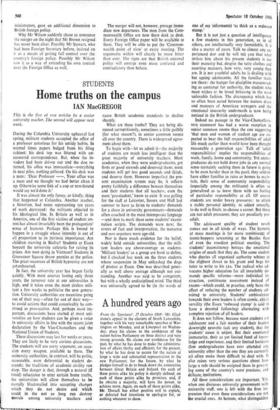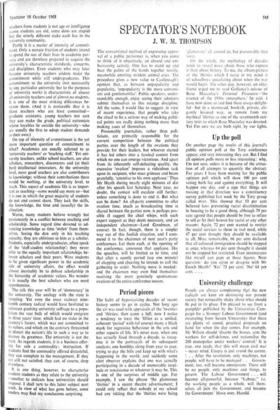Home truths on the campus
STUDENTS IAN MacGREGOR
This is the first of two articles by a senior university teacher. The second will appear next week.
During the Columbia University upheaval last spring, militant students occupied the office of a professor notorious for his untidy habits. In normal times papers bulged from his filing cabinet; his desk top was littered with un- answered correspondence. But, when the in- vaders had been driven out and the don re- turned, his office was immaculate—everything in neat piles, nothing pilfered. On his desk was a note : 'Dear Professor —, Your office was a mess and we thought we had better clean it up. Otherwise some fink of a cop or newshound would say we'd done it.'
It was almost the only funny, or kindly, thing that happened at Columbia. Another teacher, a historian, had notes representing ten years of work destroyed: the militants objected to his ideological line. In Britain as well as in America, one of the first victims of student un- rest has almost invariably been the protagonists' sense of humour. Perhaps this is bound to happen in a struggle whose intensity is out of all proportion to its intrinsic importance. Are children starving in Biafra? Students at Essex boycott the university cafeteria for raising its prices. Are men dying in Vietnam? Students in Grosvenor Square throw pennies at the police. The great resources of British hypocrisy are not yet exhausted.
In fact, the university year has begun fairly quietly. With most courses lasting only three years, the turnover rate at our universities is high, and it takes even the most tireless mili- tant a few weeks to politicise the new genera- tion. University authorities are meantime going out of their way—often far out of their way— to avoid actions that could conceivably be con- strued as provocative. And, perhaps most im- portant, discussions have started at most uni- versities on how students can be given a voice in university affairs in line with the recent joint declaration by the Vice-Chancellors and the National Union of Students.
These discussions may last for weeks or years. They are likely to be very curious discussions. The students will use every argument, on occa- sion every weapon, available to them. The university authorities, in contrast, will be polite, reasonable, even deferential to student de- mands; the traditions of academic civility run deep. The danger is that, through a natural (if timid) reluctance to utter certain home truths, the universities will allow themselves to be morally blackmailed into accepting changes which they do not desire and which could in the not so long run destroy morale among university teachers and cause British academic standards to decline sharply.
What are these truths? They are being dis- cussed surreptitiously, sometimes a little guiltily (for what reason?), in senior common rooms all over the country. There is widespread agree- ment about them.
To begin with—let us admit it—the majority of students are much less intelligent than the great majority of university teachers. Most academics, when they were undergraduates, got firsts or good seconds and deserved them; most students will get less good seconds and thirds, and deserve them. However imperfect the pre- sent examination system may be, it reflects pretty faithfully a difference beween themselves and their students that all teachers, even the most 'pro-student,' know to exist. It was galling for the staff at Leicester, Sussex and Hull last summer to have to listen to students' demands for a share in university government—demands often couched in the most intemperate language —and then to mark these same students' exami- nation scripts. The , demands were new; the errors of fact and interpretation, the nonsense and non sequiturs were age-old.
Nor is there much evidence for the belief, widely held outside universities, that the mili- tant leaders are above-average as students. 'Militant leaders' as a group are hard to define, but I checked last week on the three students whose suspension in May unleashed the dogs of protest at Essex. One was described gener- ally as well above average although not out- standing. Another was said to be competent, but with a wholly undisciplined mind. The third was universally agreed to be (in the words of
one of my informants) 'as thick as a redwood stump.'
But it is not just a question of intelligence a few students in this generation, as in al others, are intellectually very formidable. It it also a matter of years. Talk to almost any ex. perienced don and he will tell you that what strikes him about his present students is nol their maturity but, despite the tatty clothes and assertive manners, how very, very young they are. It is not youthful adults he is dealing with but ageing adolescents. All the familiar traits are there: the hunger for discipline masquerad- ing as contempt for authority, the student who most wishes to be loved behaving in the most unlovable fashion. The discrepancy which has so often been noted between the mature dress and manners of American teenagers and the emotional insecurity underneath is now being noticed in the British undergraduate.
Indeed no passage in the Vice-Chancellors. Nus statement has had a worse reception in senior common rooms than the one suggesting `that men and women of student age are ex- pected to bear the full responsibilities of adult life much earlier than would have been thought reasonable a generation ago.' Talk of 'adult responsibilities' implies the responsibilities of work, family, home and community. Yet under- graduates do not hold down jobs in any normal sense (certainly sacking them in future is going to be even harder than in the past), they seldom have either families to- raise or homes to main- tain, their sense of community responsibility (especially among the militants) is often so generalised as to leave them with no feeling of particular responsibility at all. Of course students are under heavy pressures: to attain a stable personal identity, to adjust sexually, to do well in finals, to choose a career. But these are not adult pressures; they are peculiarly pre- adult.
The adolescent quality of student revolt comes out in all kinds of ways. The hysteria at mass meetings is far more reminiscent of teenie-boppers screaming at the Beatles than of even the rowdiest political meeting. The students' inconsistency betrays the emotional origins of much that they do. The same student who decries all organised authority whines at the slightest threat to his grant and begs his tutor to write to his LEA. The radical who ad- vocates higher education for all invariably de- mands specific reforms—more individual in- struction, continuous assessment instead of exams—which could, in practice, only have the effect of reducing the number of students ad- mitted to university. Students' ambivalence towards their own leaders is often comic, abject servility (the Essex 'redwood stump' is said to have a devoted following) alternating with complete rejection of all leaders.
It does not follow, because most students are adolescent and a fair number of their leaders downright neurotic (ask any student), that the students' cause is unjust. But their emotional immaturity, their as yet limited fund of know- ledge and experience, and their limited horizons (few undergraduates have ever attended any university other than the one they are currently at) often make them difficult to deal with. It also raises very serious questions about how large a role should be assigned them in govern- ing some of the country's most precious, and delicate, institutions.
All these considerations are important. Yet, when one discusses university government with university staff, one is left with the firm im- pression that even these considerations are not -the -crucial ones. At bottom, what distinguishes
teachers from students is not age or intelligence (some students are old, some dons are stupid) but the utterly different stake each has in the university community.
Partly it is a matter of intensity of commit- ment. Only a minute fraction of students intend to spend the rest of their lives in academic pur- suits and are therefore prepared to acquire the university's characteristic standards, concerns, and disciplines. Even students who may later become university teachers seldom make the commitment while still undergraduates. This commitment to the university (not necessarily to any particular university but to the purposes of university work) is characteristic of almost all university teachers and of almost no students.
It is one of the most striking differences be- tween them. (And it is noticeable that it is
those teachers who are least committed—
graduate assistants, young teachers not sure they can make the grade, political extremists whose loyalties lie outside the university—who are usually the first to adopt student demands as their own.) On top of intensity of commitment is the yet more important question of commitment to what? Academics are usually referred to as `university teachers' or 'teaching staff.' Yet uni- versity teachers, unlike school teachers, are also scholars, researchers, discoverers and (at their best) intellectual innovators. At the university level, most good teachers are also contributors to knowledge; without their contributions there would be nothing, at the university level, to teach. This aspect of academic life is as impor- tant as teaching—some would say more so—but it is one in which the great majority of students do not and cannot share. They lack the skills, the knowledge, the time and (usually) the in- clination.
Worse, many students believe wrongly but passionately in a conflict between teaching and scholarship. Some regard time devoted to ad- vancing knowledge as time 'stolen' from them- selves. Seeing the don only in his teaching capacity, they are oblivious to him as a scholar.
Students, especially undergraduates, often speak of the 'staff-student relationship'; they never refer to the equally important relationships be- tween scholars and their peers. Were students to be given significant power in the academic side of university affairs, the effect would almost inevitably be to debase scholarship in the hierarchy of academic values. No wonder it is usually the best scholars who are most apprehensive.
The talk this year will be of 'democracy' in the university. The analogy with the state is tempting. Yet even the most stalwart nine- teenth century radical would have hesitated to advocate granting university suffrage to a popu- lation the vast bulk of which would emigrate in three years' time, which had no stake in the country's future, which was not committed to its values, and which on the contrary threatened to distort the nation's life in such a way as to destroy its greatness. The university is not the state. As regards students, it is a business offer- ing for sale a commodity: instruction. If students find the commodity offered distasteful, they can complain to the management. If they are still not satisfied, they can, of course, shop elsewhere.
It is one thing, however, to characterise modern students as they relate to the university —another to indicate how universities should respond. I shall turn to-this latter subject next week. In view of what has gone before, some readers may find my conclusions surprising.







































 Previous page
Previous page